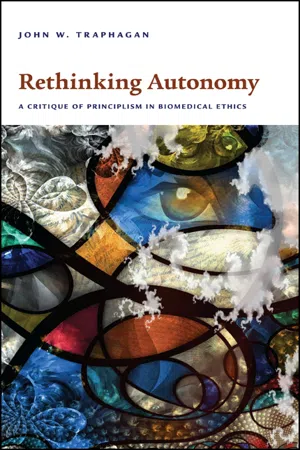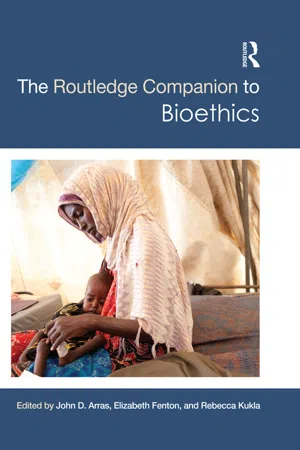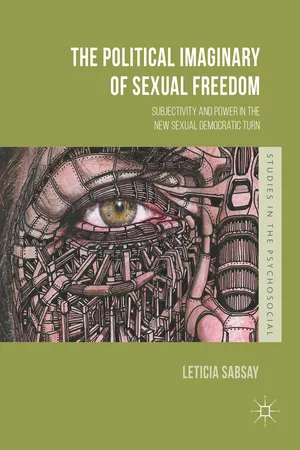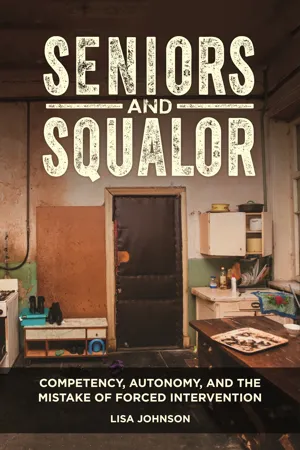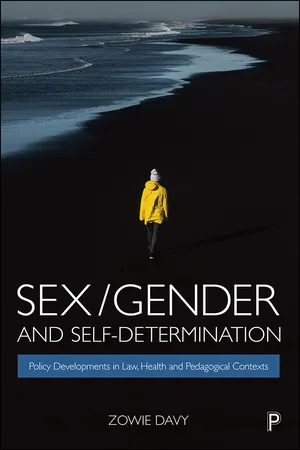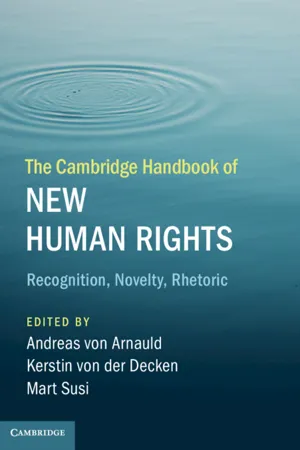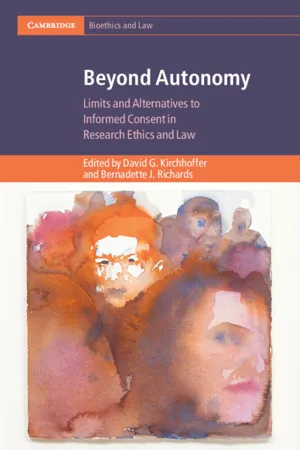Politics & International Relations
Body Autonomy
Body autonomy refers to the principle that individuals have the right to make decisions about their own bodies, free from external interference or coercion. This includes the right to make choices about healthcare, reproduction, and bodily integrity. It is a fundamental aspect of individual freedom and human rights, often central to debates around issues such as abortion, contraception, and medical treatment.
Written by Perlego with AI-assistance
Related key terms
1 of 5
8 Key excerpts on "Body Autonomy"
- eBook - ePub
Rethinking Autonomy
A Critique of Principlism in Biomedical Ethics
- John W. Traphagan(Author)
- 2012(Publication Date)
- SUNY Press(Publisher)
Chapter 2 Self, Autonomy, and BodyThe only security against political slavery, is the check maintained over governors, by the diffusion of intelligence, activity, and public spirit among the governed.—J. S. Mill (1994:333)2.1. Principles and Ethics
In this chapter, I focus on the issue of autonomy, which I view as the conceptual product and generator of the Western (particularly American) notion of the self as atomistic and ontologically isolated from other selves. It is important to keep in mind the fact that theoretical approaches to culture that set up dichotomies between individualist versus collectivist societies are rarely, if ever, accurate. Nonetheless, political and philosophical doctrines that shape ethical decision making often are structured in terms of very clearly and simplistically elaborated ideas and assumptions about the relationship of one person to other persons and to the institutions that form society. The problem of autonomy lies at the center of the neoliberal emphasis on individual freedom and resistance to controlling authority (McNay 2009:56 ) that has had a profound influence on shaping principlist biomedical ethics, particularly when developing theories related to concepts such as paternalism or informed consent. Autonomy itself, however, is a cultural concept, not an objective, culturally transcendent given that grounds either the self or the way in which people think selves should be connected—or disconnected.Before moving into a discussion of autonomy, I want to keep in mind the fact that when American biomedical ethicists contemplate the creation of models for moral problem solving, they often do so with little awareness of the complex ways in which people in other societies conceptualize the nature of being human and, consequently, put together their ethical systems. As Lindemann notes, American bioethicists, in particular, are quite lacking when it comes to the theoretical resources needed to either understand or address moral issues from a cross-cultural perspective (2009). Ethicists, particularly those immersed in principlist programs, often do not engage the sociological and anthropological critique of biomedicine that draws upon empirical, ethnographic data collected in cultures outside of the West (and actually often within the West, as well). As a result, ethicists often are not sufficiently aware of the critique of biomedicine developed by medical anthropologists and sociologists that has noted the fact that the process of diagnosis and treatment is not objectively remote from the ascription and creation of values and thus is not acultural. In the attempt to identify culture-transcendent principles, there often is a failure to recognize that humans are inherently cultural beings and that both knowledge and knowing are culturally embedded (Stout 1988:24 - eBook - ePub
- John D. Arras, Elizabeth Fenton, Rebecca Kukla, John D. Arras, Elizabeth Fenton, Rebecca Kukla(Authors)
- 2014(Publication Date)
- Routledge(Publisher)
Part V AUTONOMY AND AGENCY DOI: 10.4324/9780203804971-25The concept of autonomy has played a central role in contemporary bioethics. It is not the only important moral principle relevant to bioethical debates—notions of beneficence, harm prevention, justice, solidarity, and human rights also play significant roles—but autonomy has arguably been the most salient value across a wide spectrum of bioethical debates, including the foundations of the physician–patient relationship, the ethics of reproduction, research on human subjects, organ transplantation, public health, and so on.At its Greek linguistic root, autonomy refers to self-government (auto-nomos) or the ability to direct one’s actions and life according to one’s own values; it thus taps into deep wellsprings of ethical and political thought in both the Western and Eastern traditions. Notwithstanding the great value we all place on individual choice and self-determination, bioethical controversies are often driven by tensions between autonomy and other important values. Within the physician–patient relationship, the patient’s autonomous decision-making (e.g., a refusal of treatment) may come into conflict with the physician’s obligation to advance her patient’s health. In the reproductive arena a couple’s autonomous choices (e.g., to determine the sex of their offspring) can on occasion pose a threat to the values of physicians; conversely, sometimes the objectives and routines of reproductive specialists can undermine the autonomy of patients, leaving them with the impression that they “have no choice” but to continue trying to conceive, no matter what the cost in money and/or emotional turmoil. And in the area of public health, autonomous choices (e.g., to avoid vaccination or evacuation) can come into sharp conflicts with communal values of health and safety. How should such conflicts be thought about and resolved?This section presents several tightly integrated reflections on the theme of autonomy. We begin with Catriona Mackenzie’s provision of a helpful analytical framework depicting various competing conceptions of autonomy. In contrast to those who would conceive of autonomy somewhat narrowly—e.g., as restricted to the capacity to make a reasonable choice in a given situation, or to be free of external constraints or coercion—Mackenzie argues that an adequately robust conception of autonomy requires a social context sufficiently endowed with opportunities and the conditions of dignity and self-respect. In other words, in conformity with the overall goal of this volume, she connects autonomy with social justice. - eBook - ePub
The Political Imaginary of Sexual Freedom
Subjectivity and Power in the New Sexual Democratic Turn
- Leticia Sabsay(Author)
- 2016(Publication Date)
- Palgrave Macmillan(Publisher)
19 The identity-centered political map and the new normativities that these identities configure relate directly to autonomy understood as a defining characteristic of the political. As such, autonomy refers to the control over ourselves and to the control that effectively extends cultural and political regulation to ‘others’ who are understood as lacking this autonomy. Just like those symbolic frontiers that shape the horizon of acceptable diversity, the liberal ontology of the subject imposes a limit on sexual politics in accordance with specific versions of individual autonomy. And so, the establishment of frontiers that normalize the map of diversity as well as the map of autonomy that sustains it continues to differentiate between possible and impossible political subjects.Ideas of sexual freedom are linked to a conception of autonomy that is based on the notion that subjects have an innate faculty to make autonomous choices on the basis of unconditioned reason and self-knowledge, two characteristics that shape what is understood as moral autonomy. But this idea of autonomy that conceives freedom mainly as freedom of choice also bases the capacity for being morally autonomous on notions of self-ownership, among which to be in possession of our own body takes center stage. As Anne Phillips points out, many liberal presumptions about moral autonomy are actually more dependent on notions of self-ownership than they would seem at first sight. In ‘Feminism and Liberalism Revisited: Has Martha Nussbaum Got It Right?’ a review essay on Martha Nussbaum’s book, Sex and Social Justice , Phillips indicates that ‘liberalism is primarily driven by its commitment to free choice rather than its recognition of individuals as equal and separate.’20Free choice, in this context, Phillips continues, is associated with the idea of being free to choose without the intervention of the State (or any other authority), pretty much along the lines of free market logic. Furthermore, in accounting for different feminist critiques of this conception of freedom, Phillips reminds us of Carol Pateman’s classic critique of liberalism, which is based on a masculinist contractual model based on self-ownership. As Pateman has argued, within this contractual model, freedom of choice is presented as the freedom to dispose of our bodies as our own property. In this sense, Phillips remarks that while it is absolutely relevant that each individual has the power of self-determination in relation to their bodies, this scheme already detaches the body from the self and is conceived as an objectified entity instead of part of our being.21 - eBook - ePub
Seniors and Squalor
Competency, Autonomy, and the Mistake of Forced Intervention
- Lisa Johnson(Author)
- 2018(Publication Date)
- Praeger(Publisher)
personal autonomy is used in many contexts, including, as it is used here, to our right, capacity, or desire to live as we wish.In these pages, we are concerned only with a basic autonomy of persons—and we will refer to that state of being as personal autonomy , while at the same time recognizing that the debates circling around “ideal” autonomy—what it requires, who has it and who does not—are important for the theorist but nevertheless do not necessarily drive applied theory.As such, rather than being sucked into the quagmire of the many conceptualizations of personal autonomy, we are going to sidestep much of that discussion in favor of a straightforward understanding of it. As it is used here, personal autonomy is understood as self-direction, and includes our right and our capacity to live as we wish. Feinberg provides a rather shapeless idea of personal autonomy as “the realm of inviolable sanctuary most of us sense in our own beings,”69 but he also provides more concrete terms that are in line with the manner in which it is used here:When applied to individuals the word “autonomy” has four closely related meanings. It can refer either to the capacity to govern oneself , which of course is a matter of degree; or to the actual condition of self-government and its associated virtues or to an ideal of character derived from that conception; or … to the sovereign authority to govern oneself , which is absolute within one’s own moral boundaries. (Emphasis added.)70And,The kernel of the idea of autonomy is the right to make choices and decisions.… Some of these rights are more basic and more plausibly treated as indispensable than others. Put compendiously, the most basic autonomy-right is the right to decide how one is to live one’s life, in particular how to make the critical life-decisions …71 - eBook - ePub
Sex/Gender and Self-Determination
Policy Developments in Law, Health and Pedagogical Contexts
- Davy, Zowie, Zowie Davy(Authors)
- 2021(Publication Date)
- Policy Press(Publisher)
2008 : 8) introduces an interesting dilemma:Consider two cases: Ms A sees a doctor to get a breast amputated. She suffers from breast cancer. Her doctor has recommended the treatment and she has agreed. It is a straightforward case of a legitimate intervention into bodily integrity, because it is based on voluntary informed consent. Ms B also sees her doctor to get her breast amputated. She does not suffer from cancer but is a highly ambitious archer, who believes that her athletic abilities will be considerably enhanced by the amputation. She has read widely about the Amazons and therefore knows about the optimal preconditions of drawing a bow when the obstructing body part is removed. So in the case of Ms. B we can also identify an example of voluntary mutilation. But the proposed intervention nevertheless does not seem to be justified. Why?He argues that, in liberal societies, any (medical) intervention that affects an individual’s bodily integrity and self-determination needs the support of a good reason either to perform it or not as the case may be. And because of this we must understand what is and is not a good reason. In the cases he describes, the amputation of a body part is set against two scenarios, which will affect people in complex ways. However, whose decision is it and who gets to decide whether the reason is a good one or not? This conceptualization emphasizes the importance of the service user’s personal autonomy and self-determination, more than that of the service provider. However, through supranational institutions’, nation states’, social movements’ and individuals’ demands, the notion of self-determination connected to bodily integrity in healthcare is emerging as a contested terrain of biopower and biopolitics, giving rise to multiple implications for the biopolitical management of populations (Rabinow and Rose, 2006 ) in light of contemporary healthcare practices. For instance, if we see affect as a desirous force, or form of power, that is located in either the bow/flat chest or the tumour/scalpel as a contact zone between the organic and the technical, we can bring forth an acknowledgement of the productive connections between the human and the non-human in dis-ease.10 - eBook - PDF
The Cambridge Handbook of New Human Rights
Recognition, Novelty, Rhetoric
- Andreas von Arnauld, Kerstin von der Decken, Mart Susi(Authors)
- 2020(Publication Date)
- Cambridge University Press(Publisher)
359 Part V Autonomy and Integrity Rights 360 361 The Right to Bodily Integrity 362 363 363 28 The Right to Bodily Integrity Cutting Away Rhetoric in Favour of Substance A. M. Viens What we should be able to do to our own bodies and the bodies of our loved ones is at the heart of many questions tackled by medicine, law and social policy. A central aspect of these questions concerning the body revolves around maintaining its physical integrity. It is widely held that preserving the physical integrity of the body is inherently valuable and that transgressing this integrity represents a distinctive form of wrongdoing. Indeed, some have argued that physical integrity is so important that we should have a right to bodily integrity (RBI). This chapter seeks to examine the nature and implications of such a right. In the first section, I provide a brief overview of and legal pedigree for the RBI – concentrating primarily on human rights sources and discourse around protections of the physical integrity of the human body. In the second section, I flesh out and develop some of the central conceptual underpinnings of the notion of bodily integrity and normative implications of how the RBI has been understood and interpreted within the literature, legal doctrine and public policy. In the third section, I explore what is new with the RBI – in particular the development of a specified, derivative right to genital integrity and claims that such a right would entail that a commonly practised medical procedure would constitute a human rights violation. 28.1 The Right to Bodily Integrity: Overview and Legal Pedigree It is absolutely essential to be clear on the nature of the RBI. Only through a clear articulation of the source and justification of the right will we have a clear understanding of its content, scope, strength, application and defeasibility conditions. - eBook - PDF
Beyond Autonomy
Limits and Alternatives to Informed Consent in Research Ethics and Law
- David G. Kirchhoffer, Bernadette J. Richards(Authors)
- 2019(Publication Date)
- Cambridge University Press(Publisher)
Autonomy, however, is best served when the law is focusing on other rights such as bodily integrity, freedom from assault, ownership of property and privacy (to name but a few). All of which, it could be argued, can be framed within the broader discussion of autonomy but represent other interrelated rights, duties and interests. The weakest protection of autonomy usually comes when members of the judiciary emphatically state, ‘Autonomy dictates that . . .’. Important Distinction: ‘Informed Consent’ Not Consent Before considering this in depth, an important distinction must be highlighted. When discussing ‘informed consent’ at law we are not discussing the mere agreement (or not) to undergo medical treatment. This form of consent is unproblematic and is situated in the specific area of law referred to as ‘trespass’, that is, an intentional violation of a 3 R. Huxtable, ‘Autonomy, best interests and the public interest: treatment, non-treatment and the values of medical law’, Medical Law Review, 22 (2014), 459–93, 460. . personal right. As explained in Reibl v. Hughes, ‘actions of [trespass] should be confined to cases where surgery or treatment has been per- formed or given to which there has been no consent at all or where, emergency situations aside, surgery or treatment has been performed or given beyond that to which there was consent’. 4 Therefore, at law ‘the least touching of my person is a trespass’ and there is no need for there to be intent to cause any harm. 5 There is no need to establish that there has been any harm caused. Indeed, the motivation for and material effect of the ‘interference’ could be positive. Thus, a doctor who gives a life-saving blood transfusion to a patient clearly refusing one on religious grounds will have committed a trespass. Protection of bodily integrity and, there- fore, a simply framed definition of autonomy as a right to personal sovereignty, is clearly protected at this most basic level. - eBook - PDF
- David DeGrazia, Joseph Millum(Authors)
- 2021(Publication Date)
- Cambridge University Press(Publisher)
Autonomy . Introduction The concept of autonomy has played a pivotal role in modern bioethics, as it has in the liberalism that has dominated political discourse over the last half-century. The focus on the importance of patient autonomy – with its emphasis on informed consent, patient rights, and the value of people making their own decisions about medical care – has transformed medical practice and clinical research. In this chapter, we analyze autonomy and relate it to the other components of our ethical theory. We begin by describing what we take autonomy to consist in and distinguish two ways in which autonomy is morally important for bioeth- ical questions. We then discuss respect for autonomy and its relationship to rights before delineating a taxonomy of ways in which someone’s autonomy can be interfered with. We briefly evaluate two justifications for interfering with someone’s actions: paternalistic justifications and the prevention of harm to others. One key normative role that respect for autonomy plays is in grounding the requirement to obtain consent from competent patients and research participants. We provide a detailed anal- ysis of the conditions for valid consent. When someone is not competent to make their own decisions, someone else must decide on their behalf. The last part of our ethical analysis discusses this surrogate decision- making. Finally, we turn to two more specific applications of the theory that we have developed: the right to refuse treatment and the ethics of direct-to-consumer advertising of pharmaceuticals. A preliminary point about terminology. Sometimes a distinction is drawn between the terms capacity and competence in the context of talking about someone’s ability to make their own decisions autonomously.
Index pages curate the most relevant extracts from our library of academic textbooks. They’ve been created using an in-house natural language model (NLM), each adding context and meaning to key research topics.
